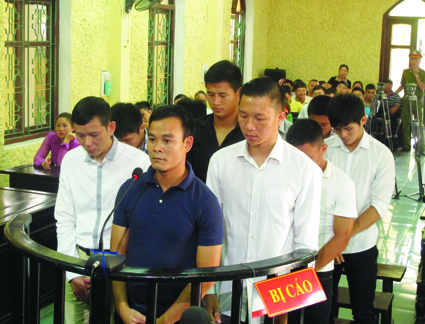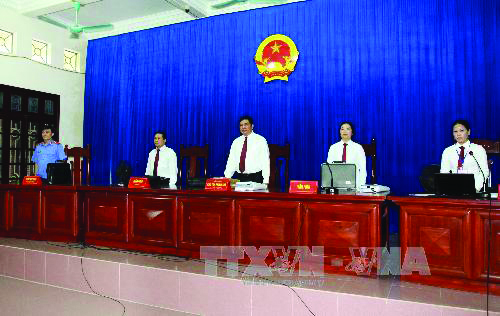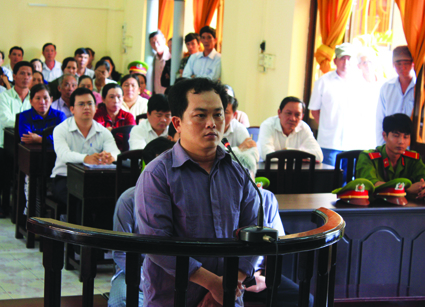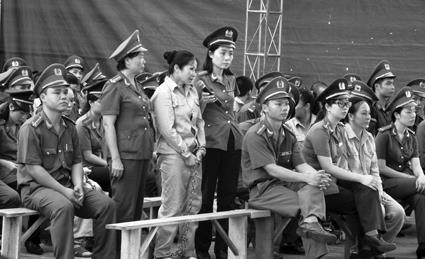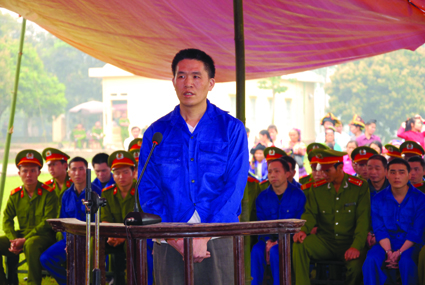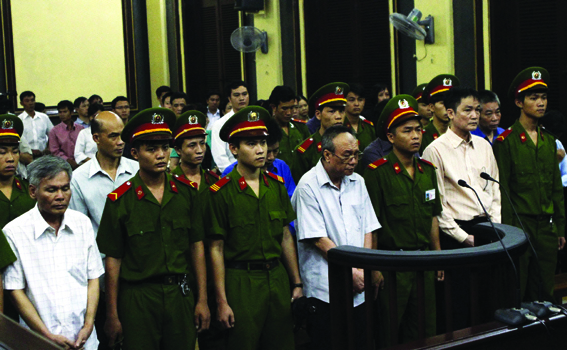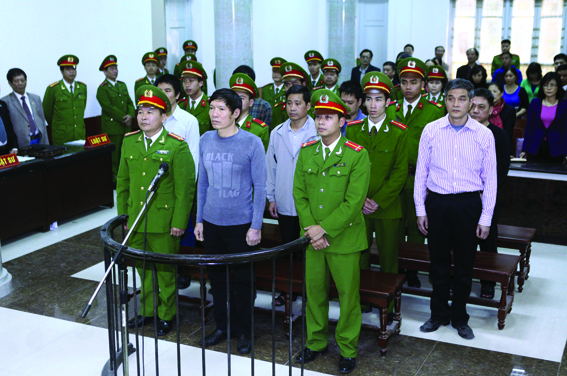Hoang The Lien, LL.D
Former Deputy Minister of Justice
Human rights and citizens’ fundamental rights are protected and enforced by the entire legal system of which the criminal law is a critical part. Therefore, a key direction for revising the Penal Code (the Code) is to further improve the penal policy toward respecting and guaranteeing the fulfillment of human rights and citizens’ democratic rights as enshrined in the 2013 Constitution.
The current Code protects these fundamental rights in the following ways:
- To protect everyone’s right to life, the Code allows the death penalty only for particularly serious crimes. The death penalty cannot be applied to juvenile delinquents, pregnant women and women nursing children under 36 months at the time of committing a crime or being tried. Death sentences will not be executed against pregnant women or women nursing under-36 month children. The Code prescribes 22 crimes that carry the death penalty and 10 others related to direct or indirect, intentional or unintentional acts of illegally taking human life (Articles 93 thru 102);
- The Code prescribes 17 crimes related to acts of illegally infringing upon human health, dignity and honor: seven that infringe upon human health (Articles 104 thru 110); six upon others’ sexual freedom, especially that of children (Articles 111 thru 116); and four upon human dignity and honor (Articles 119 thru 122).
It also criminalizes the following acts: Inflicting corporal punishment (Article 298); forcing evidence or testimony (Article 299); illegal arrest, custody or detention of people (Article 123); and handing down illegal judgments or making illegal decisions (Article 295).
To protect citizens’ freedom of association, assembly, religion and belief, the Code prescribes nine crimes that infringe upon these rights. These crimes are an infringement upon social relations related to the establishment and exercise of citizens’ rights of freedom and democracy as recognized by the Constitution.
 |
| Defendants at the hearing for the case of intentionally damaging assets in Ha Tinh province__Photo: Phan Quan/VNA |
To protect privacy, the Code prescribes two crimes (Articles 124 and 125) to prevent discretionary or illegal interference in citizens’ personal life as well as family privacy.
Further analysis of the penal policy in the light of the new Constitution with regard to the protection of human and citizens’ rights has led us to the conclusion that the Code should impose harsher penalties against those who violate these rights.
Compared to other types of crime in the Code, for the most part, these crimes carry relatively low-level penalties which are: warning, non-custodial reform and imprisonment terms of 3 months to 5 years (Clause 2, Article 123 and Clause 2, Article 132). Some crimes are subject to a single penalty frame, such as illegally forcing laborers, public employees to leave their jobs (Article 128); infringement upon citizens’ rights to assembly, association, rights to freedom of religion and belief (Article 129); and infringement upon women’s right to equality (Article 130). Strict punishment reflects the State’s attitude in protecting these rights through “deterrence” against potential offenders.
In the spirit of the new Constitution, it is necessary to revise the scope of crimes prescribed in Chapter XIII as follows: (i) Changing the title of the Chapter from “Crimes infringing upon citizens’ democratic freedoms” to “Crimes infringing upon human rights and citizens’ democratic rights”; and (ii) Amending titles and content of some articles to clearly differentiate human rights from citizens’ rights for proper identification of crimes.
According to a review report, 34 documents have been so far issued to guide the implementation of the Code, including three resolutions of the National Assembly and its Standing Committee, seven resolutions of the Justice Council of the Supreme People’s Court, six decrees of the Government and 17 inter-ministerial circulars.
More specifically, we suggest some articles of the Code be revised as follows:
Amending the additional penalty of depriving certain citizens’ rights prescribed in Article 39 of the Code
Article 39 prescribes the additional penalty of depriving certain citizens rights as follows: “A Vietnamese citizen sentenced to imprisonment for his/her crime of infringing upon national security or committing another crime prescribed by this Code shall be deprived of the following rights:
(a) The right to stand for election and to elect deputies to state power bodies; and,
(b) The right to work in state bodies and to render service in the people’s armed forces.
The time limits for the deprivation of these rights range from one year to five years after the imprisonment penalty is completely served or the judgment takes legal effect in cases where the convicted person enjoys a suspended sentence.”
We can see that only Article 92 prescribes this additional penalty for crimes against national security, particularly: “Persons who commit crimes defined in this Chapter may also be deprived of a number of citizens’ rights for between one and five years...” Other crimes that may carry this additional penalty have not been identified clearly. Therefore, we suggest that: (i) Either the phrase “another crime” in Article 39 be removed; (ii) or if Article 39 is to be kept unchanged, the phrase “another crime” should be explained, e.g., what another crime might be to which the additional penalty is applicable in order to comply with Clause 2, Article 4 of the new Constitution.
Amending the provisions concerning torture, violence, coercion and corporal punishment
Article 20 of the new Constitution prescribes: “Everyone has the right to inviolability of his or her body and to the protection by law of his or her health, honor and dignity; no one shall be subjected to torture, violence, coercion, corporal punishment or any form of treatment harming his or her body and health or offending his or her honor and dignity.” Basically, acts infringing upon these rights must be established by the penal law as crimes in order to protect these rights. Regarding torture, violence, coercion and corporal punishment, the Code has two relevant articles, namely Article 298 on corporal punishment and Article 299 on forcing evidence or testimony. The act of applying corporal punishment is not yet directly defined in the article. The act of forcing evidence or testimony involves employing illegal tricks to force persons being questioned to give false evidence, causing serious consequences. Both crimes are categorized as those infringing upon judicial activities and committed by procedure-conducting persons.
However, according to the UN Convention against Torture which Vietnam has signed, apart from the aforesaid subjects, persons “backed up” by procedure-conducting persons may commit these crimes. Besides applying corporal punishment and forcing evidence or testimony, the Convention also requires the member states to criminalize such other acts as mental coercion, etc. Therefore, further research for fully criminalizing the acts governed by the Convention to better protect human rights and citizens’ fundamental rights is needed.
Establishing as crimes acts obstructing the right to donate human tissues, organs and bodies and rights related to medical experiments
Article 20 of the 2013 Constitution for the first time recognizes and protects the right of a person to donate his/her tissues, organs and body as well as the right to allow medical, pharmaceutical, scientific or any other form of experiment on his/her body. Accordingly, everyone has the right to donate his or her tissues, organs or body in accordance with law. Medical, pharmaceutical, and scientific experiments or any other form of experiment on the human body must be consented to by the human subject. Yet, the Code does not have any particular provisions to protect such rights. It is therefore necessary to additionally prescribe as crimes in the Code acts that obstruct these rights or violate the State’s regulations protecting these rights.
Criminalizing acts infringing upon personal and family privacy
Article 21 of the new Constitution prescribes that everyone has the right to inviolability of private life, personal secrets and family secrets; and has the right to protect his or her honor and reputation. The security of information about private life, personal secrets or family secrets shall be guaranteed by law; and everyone has the right to privacy of correspondence, telephone conversations, telegrams and other forms of private communication. No one may illegally break into, control or seize another’s correspondence, telephone conversations, telegrams or other forms of private communication.
Though the Code prescribes crimes against privacy and safety of correspondence, telephone conversations and telegrams, it does not criminalize acts infringing upon personal and family secrets. Through the review of the implementation of the Code, there are more and more cases where information about personal privacy and family secrets is collected and spread in the social networks and mass media causing serious consequences. So, it is a must to prescribe this act as a crime in the Code. Furthermore, is it necessary to regard the fact of “causing serious consequences” as one of the components of this crime? In our opinion, the act itself is sufficient to constitute a crime even when it does not necessarily cause serious consequences because serious consequences of this act are difficult to identify, and the importance of the protection of human and citizens’ rights is emphasized in the Constitution.
Adding provisions on acts preventing citizens from exercising their freedom of speech, freedom of the press, right to access to information, freedom of assembly, association or demonstration, or abusing such rights to harm interests of individuals or organizations
Article 25 of the new Constitution entitles citizens to the freedoms of speech, of the press, access to information, assembly, association and demonstration. However, the Code has no provisions on the protection of such freedoms. Article 258 of the Code on abusing democratic freedoms to infringe upon the interests of the State, the legitimate rights and interests of organizations or citizens is ambiguous and prone to misapplication. It is therefore necessary to specify cases where the interests of the State are infringed upon and where the legitimate rights and interests of organizations and citizens are harmed. Provisions on acts obstructing the exercise of such rights and the right to vote in a referendum held by the State under Article 29 of the new Constitution are also needed.
Adding provisions on acts infringing upon the right to social security
Article 34 of the new Constitution stipulates that citizens are guaranteed the right to social security. However, the Code lacks provisions on handling of acts infringing upon this right. At present, a number of employers, including also state-owned enterprises, are shirking the obligation to pay insurance premiums for their employees or illegally using insurance sums of their employees, putting the employees at risk of being uninsured when falling ill or getting old. Therefore, the failure to pay insurance premiums for employees and illegal use of employees’ insurance funds causing serious consequences should be criminalized.
Adding the crime of forcing child labor
Article 37 of the new Constitution prohibits the abuse and exploitation of child labor. Whereas, the Code has only one article on breaching the regulations on employment of children (Article 228) to handle cases where children are employed to perform heavy, dangerous or hazardous jobs, but lacks provisions on acts of forcing children to work. Such provisions should be added to the Code for better protection of children’s rights in compliance with the Constitution.-
